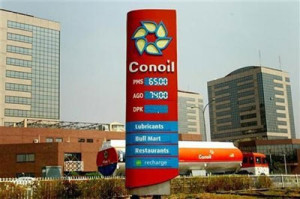Oil
Oil marketers dare Nigerian Govt, says it lacks will power to remove oil subsidy
The Major Oil Marketers Association of Nigerian,(MOMAN), the body controlling over 50 percent of Nigeria’s downstream petroleum industry has alleged that the Federal Government lacks the political will-power to remove fuel subsidy in the country.

By Joseph BAMIDELE
The Major Oil Marketers Association of Nigerian,(MOMAN), the body controlling over 50 percent of Nigeria’s downstream petroleum industry has alleged that the Federal Government lacks the political will-power to remove fuel subsidy in the country.
The body insisted that it is unrealistic for the Government to embark on subsidy removal because it is a process that can not be rushed.
Obafemi Olawore, spokesman of the body said fuel subsidy does exist and all effort should be geared towards removing it adding that government should be ready to bite the bullet.
Olawore who made this know during the Vanguard Conference meeting at Vanguard Media headquarters inLagoswhere he noted that there has not been enough political will to remove the subsidy.
He said “If we continue to say that government is bleeding, the economy is bleeding because we are spending money on subsidy and we are not making effort to block it then there is a problem.”
Explaining the reason for the existence of fuel subsidy in the country, Olawore noted that what is produced in the country is not sufficient for the country that is why “the country has to resort to importation of PMS.”
“Once you buy at the international market, there is going to be a difference of what is produced and what you are told to sell.
“Whether it is right or wrong is not what am after. What I am after is the fact that somebody is buying the product at a particular price and therefore he has to recover his cost, if he does and he recovers fully and you tell him to sell at a lower price then there is gap and that gap is the subsidy.”
He however, suggested that the removal of subsidy should be done in phases.
“If the removal of subsidy in one sweep will be too traumatic for the economy, then government should agree with all the stakeholders to do it in phases.
“We have been talking about this phases for a very long time. Six months may not be ideal, maybe 12 months, 18 months but everybody must be carried along.
“Ghanadid it for a period of 24 months and they did it gradually and we saw what they were using the money for.
“The removal of subsidy is a political thing. If government can continue to be paying subsidy, all well and good. But for me it is not the best because it does not pay anybody if we continue to have subsidy. Government should bite the bullet.
“Am a player in the industry and I believe that it is not the seller that actually gains from it. Because the seller has bought the product at a higher price and is forced to sell at a lower price, having incurred the cost upfront, he is entitlede to reimbursement which is the subsidy. Again whether it is right or wrong is a different matter.”
Oil
FG Introduces New Incentives To Revitalize Nigeria’s Oil & Gas Industry
In a strategic move to revitalize Nigeria’s oil and gas sector, the Federal Government has unveiled two key fiscal incentives aimed at attracting investment and enhancing energy security.
The announcement was made by Mr. Wale Edun, the Minister of Finance and Coordinating Minister of the Economy on Wednesday.
The first initiative, the Value Added Tax (VAT) Modification Order 2024, introduces critical exemptions for essential energy products and infrastructure, including Diesel, Feed Gas, Liquefied Petroleum Gas (LPG), Compressed Natural Gas (CNG), Electric Vehicles, Liquefied Natural Gas (LNG) infrastructure, and Clean Cooking Equipment.
Read Also: Atiku Calls For Rotational Presidency Across Nigeria’s Geopolitical Zones
These exemptions are designed to reduce living costs for Nigerians, promote energy security, and accelerate the transition to cleaner energy alternatives.
The second initiative, the Notice of Tax Incentives for Deep Offshore Oil & Gas Production, offers new tax relief options for deep offshore exploration projects.
This measure aims to position Nigeria’s deep offshore basin as a premier destination for international oil and gas investments, boosting the country’s appeal to foreign investors.
These reforms are part of a broader set of policy initiatives, known as Policy Directives 40-42, endorsed by President Bola Ahmed Tinubu.
The directives reflect the administration’s commitment to fostering sustainable development in the energy sector and enhancing Nigeria’s competitive edge in the global oil and gas market.
Business
Tinubu set to approve ExxonMobil-Seplat oil deal, expands CNG bus initiative

By Yemie Adeoye
NIGERIA’s President Bola Tinubu has announced that the protracted ExxonMobil-Seplat upstream oil divestment will be formally approved by the Minister of petroleum within a matter of days, just as he announced his government’s intention to expand the Compress natural Gas, CNG buses initiative.
The President who stated this during his Independence day nationwide broadcast stated that the move is in line with his administration’s commitment to free enterprise, free entry and free exit in investments which is the hallmark of his administration investment policy.
“Fellow compatriots, our administration is committed to free enterprise, free entry, and free exit in investments while maintaining the sanctity and efficacy of our regulatory processes. This principle guides the divestment transactions in our upstream petroleum sector, where we are committed to changing the fortune positively. As such, the ExxonMobil Seplat divestment will receive ministerial approval in a matter of days, having been concluded by the regulator, NUPRC, in line with the Petroleum Industry Act, PIA. This was done in the same manner as other qualified divestments approved in the sector.”
The President also seized the opportunity to plead with Nigerians to be patient with his administration’s reform policies. “As your President, I assure you that we are committed to finding sustainable solutions to alleviate the suffering of our citizens. Once again, I plead for your patience as the reforms we are implementing show positive signs, and we are beginning to see light at the end of the tunnel”.
“Our energy transition programme is on course. We are expanding the adoption of the Presidential Initiative on Compressed Natural Gas for mass transit with private sector players. The Federal Government is ready to assist the thirty-six States and FCT in acquiring CNG buses for cheaper public transportation.
Fellow Nigerians, while we are working to stabilise the economy and secure the country, we also seek to foster national unity and build social harmony and cohesion. Our economy can only thrive when there is peace”. he enthused.
Oil
ExxonMobil To Invest $10bn In Nigeria’s Deep-Water Oil Operations
As part of the administration’s push to improve Ease of Doing Business (EoDB), Nigeria’s Vice President Kashim Shettima has expressed support for ExxonMobil’s plan to invest $10 billion in the country’s deep-water oil sector.
Speaking on Wednesday, September 25, 2024, during a meeting with ExxonMobil executives at the 79th United Nations General Assembly (UNGA) in New York, Shettima called the investment “a clear testament to the administration’s economic reforms and investor-friendly policies.”
Read Also: Offset Accuses Cardi B Of Cheating During Pregnancy
This announcement follows news that international maritime company DP World intends to develop a multibillion-dollar port project in Nigeria.
Stanley Nkwocha, Senior Special Assistant to the President on Media and Communications, shared the development in a statement on Wednesday. He quoted Shettima as saying: “ExxonMobil’s potential investment aligns with the vision of President Bola Ahmed Tinubu’s administration for a more investment-friendly Nigeria.
We are committed to fostering an environment that supports such transformative projects.”Shettima also discussed the administration’s broader efforts to improve the ease of doing business, highlighting the “Renewed Hope Agenda,” which aims to simplify bureaucratic processes, enhance transparency, and offer fiscal incentives to attract global investors.
“Our administration has taken bold steps to unify the exchange rate, remove fuel subsidies, and implement tax reforms. These measures, though challenging in the short term, are intended to create a stable and predictable business environment in the long term,” he added.
On the oil and gas sector, Shettima mentioned that the government is revising the fiscal framework for deep-water operations to attract investment while ensuring fair returns for the Nigerian people.










